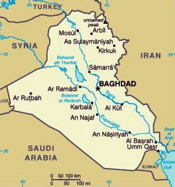NEW YORK -- The evidence of Gen. Ahmed Ibrahim's service to the United States is scattered throughout his apartment, which overlooks the East River in Manhattan near his office at the United Nations. Ornate certificates attesting to his counterterrorism training adorn the walls. Pictures of him shaking hands with Donald Rumsfeld and chatting with Bernard Kerrick and Paul Bremer are clear reminders of Ibrahim's close relationship to the United States. It is a relationship that he is afraid soon will lead to his death. Ahmed Ibrahim was born and grew up in Baghdad, and in 1973 graduated from the Baghdad Police Academy. There, he says, he acquired an unfortunate and hazardous reputation as a critic of Saddam. He was arrested in 1979 for criticizing the dictator and spent a year in prison, where he says he was repeatedly tortured. But Saddam's need for manpower in the war against Iran allowed him to return to a government position, and he worked at a border outpost during the Iran-Iraq War. He opposed Saddam's invasion of Kuwait and managed to pay to be transferred to northern Iraq during the First Gulf War. He continued to work in Saddam's regime until 2000, when he ran afoul of Uday, Saddam's ruthless son. Narrowly escaping the three men sent to arrest him, Ibrahim fled to Kirkuk in the Kurdish north, beyond the reach of Saddam. He stayed there until the American invasion. On April 10, 2003, took a gamble that would change his life forever. It was 3 a.m. in Baghdad when Ibrahim heard that the Iraqi police were being asked by the U.S. military to return to work. After some internal struggle, Ibrahim decided to throw his lot in with the Americans, in spite of the rapidly changing situation and the fact that Saddam and his sons were still at large. He understood the risks. "If you believe in democracy and work with the Americans, you must be ready to pay for your life," he told World Politics Review last month. He made initial contact with a tank squad leader named Capt. Todd Kelly. With a good command of English, an openness to the Americans, and previous experience in the Iraqi police force, Ibrahim soon found himself on a quick rise to the top. In spite of being shot in a botched operation that killed one of his police lieutenants, he remained committed to the Americans. "If an Iraqi or an American was killed, you can't find who is my blood and who is his blood. It is mixed," Ibrahim said. By July of 2003, just three months after starting work with coalition forces, he was promoted to the highest ranking police position possible: Chief of the Iraqi National Police.
Former Iraqi Police Chief Fears for His Life Upon Return to Iraq

